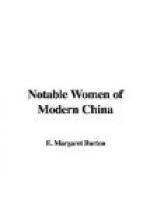During this first year of work in the Woolston Hospital Dr. Hue had two medical students in training, who also assisted her in the hospital work, one of them her younger sister, Hue Seuk Eng. She speaks warmly of their work among the patients, and of the patients’ appreciation of what was done for them. “Very frequently,” she wrote at the close of the year, “I hear the patients say, ’Truly my own parents, brothers, and sisters could never be so good, so patient, and do so carefully for us; especially when we are so filthy and foul in these sore places. Yes, this religion must be better than ours.’”
Thus, although the work was begun in fear and trembling, and the young physician had some obstacles to overcome, she treated 2,620 patients during the first year, and was able to report a most encouraging outlook at its close.
IV
THE BELOVED PHYSICIAN
As Dr. Hue’s work grew it fell into four main divisions; the dispensary work, the work among the hospital patients, visits to the homes of those too ill to come to her, and the superintendence of the training of medical students. The city hospital has been crowded almost from the very outset. The situation was somewhat relieved in 1904, by the building of a house for Dr. Hue on Black Rock Hill. This enabled her to move out of the hospital and thus enlarged the space available for patients; but the additional space was soon filled and the building was as crowded as before. Dr. Hue is utilizing the building to the best possible advantage. One of her fellow missionaries writes that every department is as well arranged as in any hospital she has ever seen; every nook and corner is clean and tidy, students are happy, helpful, and studious, and patients are cared for both physically and spiritually.
The hospital records hold many a story of those who found both physical and spiritual healing during their stay there. One day a woman over fifty, whose husband and son had died while she was very young, came to the hospital for treatment. When she was only twenty-two, crushed by her grief, and feeling, as she said, that there was no more pleasure in this world for her, she made a solemn vow before the idols that she would be a vegetarian for the rest of her life, hoping in this way to obtain reward in the next life. At the time she came to the hospital she had kept this vow sacredly for nearly thirty years, being so scrupulous in her observance of it that she even used her own cooking utensils in the hospital, lest some particle of animal matter should have adhered to the others and thus contaminate her food. She was so unostentatious about it, however, that Dr. Hue did not know she was a vegetarian until she prescribed milk for her.




